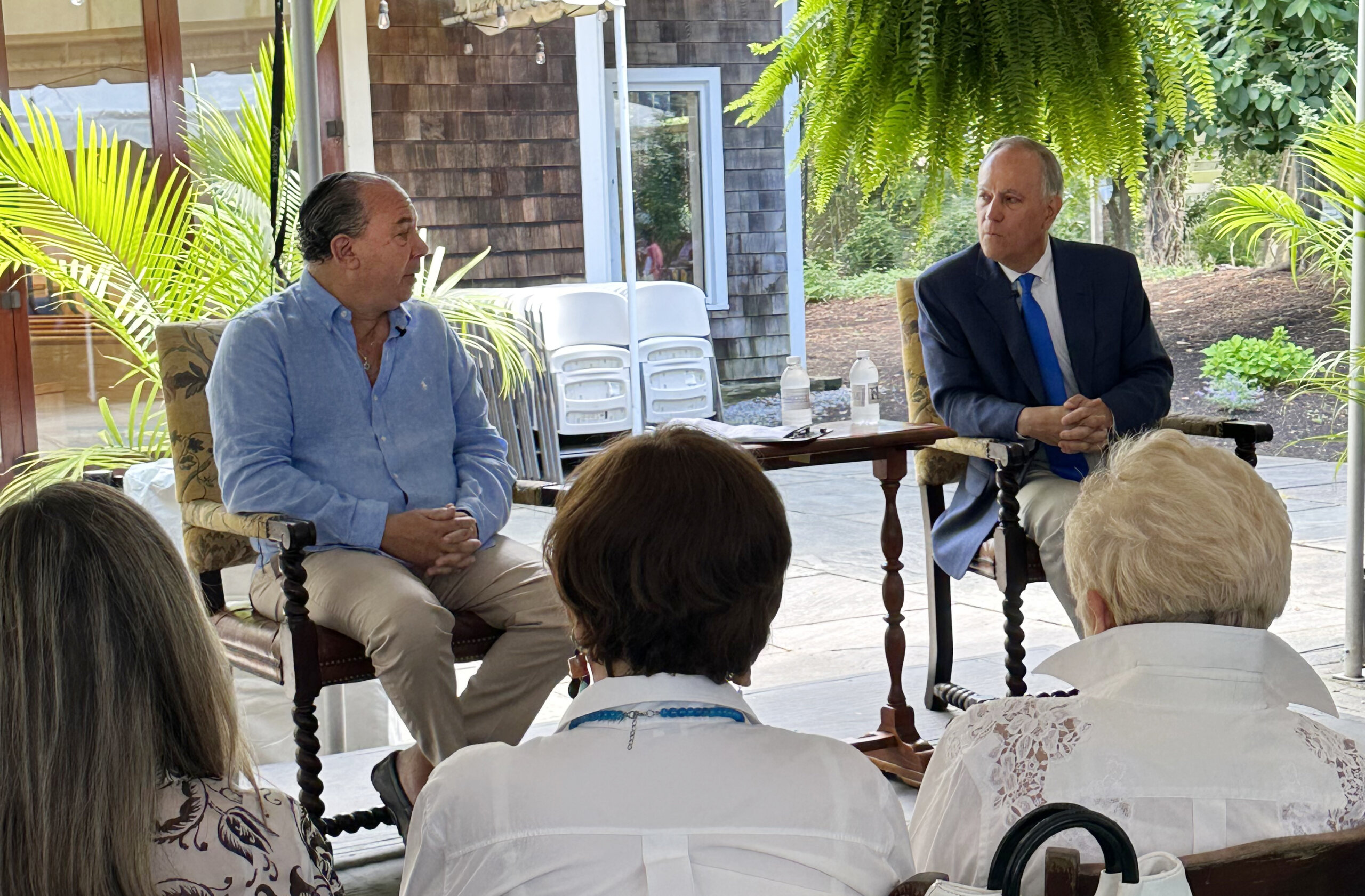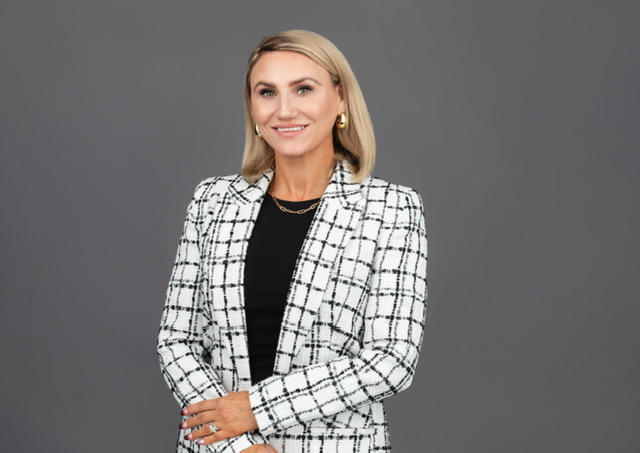CUNY Chancellor Addresses Campus Antisemitism, Anti-Israel Bias at Hampton Synagogue

Felix V. Matos Rodriguez, Chancellor of the City University of New York (CUNY), sat with Senior Rabbi Marc Schneier on Sunday at the Hampton Synagogue in Westhampton Beach for a respectful but sometimes heated Q&A session.
The conversation was part of the synagogue’s ongoing Global Breakfast Series, which focuses on diplomacy, politics and matters of faith.
As Rabbi Schneier pointed out in his opening remarks, the massive CUNY system is collectively the nation’s largest urban university, with 400,000 students, faculty and support staff spread across 25 different campuses in the five boroughs of New York City.
Chancellor Rodriguez called CUNY “one of the key indispensable institutions in the city,” adding that 65 percent of its students attend one or more of the individual universities in the system tuition-free, and that 75 percent graduate with no student loan debt whatsoever.
Rodriguez also noted that half of all new nurses entering the workforce in New York City are CUNY graduates, as are a third of all new teachers in the city.
While the university system’s scope and reach are impressive, many of the congregants in the audience were most interested in hearing Rodriguez’s comments on what Schneier dubbed “a toxic antisemitic environment at CUNY.”
Schneier noted that some Jewish professors had told him that they worried about their safety on campus, adding that, “we even heard from students who said, ‘we will no longer wear our yarmulkes or anything that identifies us as Jewish out of fear.’”
A large portion of the approximately hour-long session focused on recent events at CUNY, including what were judged to be vehemently anti-Israel — and by extension, antisemitic — comments delivered in 2022 by CUNY valedictorian Nordeen Kiswani, and in 2023 by CUNY Law School graduate Fatima Mousa Mohammed.
Schneier noted that Kiswani “openly called for the abolishment of the State of Israel.” The Rabbi also characterized parts of Mohammed’s speech as “a horrific diatribe against Israel.”
In the eyes of Schneier, as well as many of the Hampton Synagogue’s congregants and a number of media outlets, Mohammed’s comments represented a bridge too far and a microcosm of the problematic relationship between CUNY’s students and faculty and the Jewish community. \
In addition to the incendiary nature of Mohammed’s speech, Schneier and several congregants took exception to actions taken by certain members of CUNY’s faculty and administration — actions that occurred before, during and after the speech.
For example, Rodriguez elicited murmurs of disapproval from the synagogue’s audience when he told Schneier that, per CUNY policy, Mohammed’s speech was not required to be vetted for “objectionable” content, only for approximate length.
“The students share their remarks with the Office of Student Affairs. But it’s not a vetting process,” Rodriguez said. “It’s mainly there to make sure that the students stay within the time allotted for the ceremony. In this case, the Office of the Dean encouraged [Mohammed] to make her remarks appropriate for the commencement — not to be so toxic.
That input was shared,” he continued. “But it was disregarded by the student, who also used the platform to go even deeper into a toxic environment.”
Also cited as a particularly contentious issue was the Law School Dean’s real-time reaction to Mohammed’s speech at the ceremony. Dean Sudha Setty was widely observed politely clapping during remarks that were deemed offensive to Jews.
While stopping short of condoning Setty’s actions at the commencement, Rodriguez did come to the Dean’s defense. He told the synagogue’s audience that having joined the Law School as Dean in July of 2022, “Setty was new to us. But since coming in, she has been working on messaging about inclusion and civility.”
As further evidence of a significant anti-Israel bias, Schneier noted that the CUNY Law School student body had voted to ban the Jewish student support organization Hillel from campus. The Rabbi also pointed out that the Law School faculty had voted to endorse the BDS (Boycott, Divestment and Sanctions) movement, which seeks to economically and politically pressure Israel into concessions on Palestinian self-rule.
“We have different groups at the university that exercise what they perceive to be their rights of free speech,” Rodriguez said. “But I want to be very clear in my actions that [support for BDS] is inconsistent with the view of the university.”
Facing an almost exclusively Jewish audience for the first time since Fatima Mousa Mohammed’s speech drew national media attention, Rodriguez cited a litany of additional steps he and his administration have either already taken or are planning to take in order to combat anti-Israel sentiment and antisemitism on historically liberal CUNY campuses.
Rodriguez cited a trip he recently took to Israel with a delegation of 12 university presidents to directly engage Jewish organizations and educational institutions on a number of issues, including strategies to fight antisemitism, and to mitigate the growing support for the BDS movement among CUNY professors and students.
Additionally, a recently formed advisory council featuring Rabbi Schneier and a roster of prominent leaders of the Jewish community has already delivered its initial set of recommendations to Rodriguez and his administration. And Governor Hochul has provided $750,000 in new funding to CUNY — money that is expressly earmarked for fighting antisemitism on campus.
Under Rodriguez, CUNY has also instituted a program that makes it easier to report discrimination based on antisemitism or hate via a centralized and continuously monitored online portal.
Smaller measures include a new program designed to help non-Jewish students, faculty and support staff learn and respect Jewish holidays, which are protected on campus by state and federal laws.
The session ended with a pointed request from the Rabbi — and an equally pointed response from the Chancellor.
“We have faith in you,” Schneier said. “You have an opportunity to be a role model. “I’m issuing this public charge. Be our friend. Be our representative.”
“Role modeling begins with the Chancellor,” Rodriguez replied. “That’s why I’m here today.”









